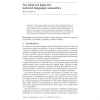662 search results - page 2 / 133 » Computing the Temporal Structure of Events in Natural Langua... |
107
click to vote
NAACL
2007
15 years 1 months ago
2007
Previous work on discourse parsing has mostly relied on surface syntactic and lexical features; the use of semantics is limited to shallow semantics. The goal of this thesis is to...
90
Voted
CICLING
2006
Springer
15 years 2 months ago
2006
Springer
Abstract. This paper argues that wordnets, being concept-based computational lexica, should include information on event and argument structures. This general approach is relevant ...
126
click to vote
AIML
2008
15 years 1 months ago
2008
Most temporal logics, particularly interval temporal logics, are not expressive enough to capture meanings of natural language constructions, and they are not convenient to represe...
116
click to vote
JUCS
2008
15 years 12 days ago
2008
: Reasoning about incomplete qualitative temporal information is an essential topic in many artificial intelligence and natural language processing applications. In the domain of n...
102
click to vote
SOCO
2010
Springer
14 years 7 months ago
2010
Springer
Abstract When searching for information about historical events, queries are naturally formulated using temporal constraints. However, the structured temporal information needed to...

